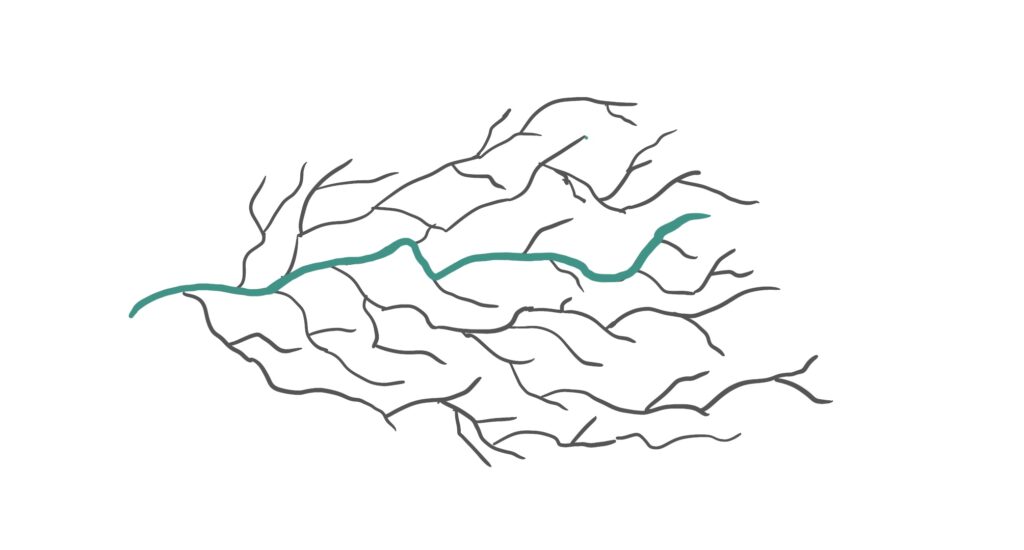“Two roads diverged in a wood, and I—I couldn’t make up my mind.”
I have always been indecisive. I put off hard choices for as long as possible. I’ll waste months waffling over a decision that to others often appears quite obvious. And if I let you peer into my journals from over the years, you would discover pages littered with anxious frettings and lengthy pros/cons lists.
It’s hard to make choices.
Yet, every day confronts us with countless options:
- What will I wear?
- Which toothpaste shall I buy?
- What will we have for dinner?
- What will we watch on Netflix?
And while most choices are fairly inconsequential (your toothpaste will not change your life, despite what the commercials tell you), there is a gravity to decision-making that cannot be ignored. This is especially true in the weightier matters of life, as in decisions that affect career, family, or finances. It makes sense that these dilemmas often leave us hemming and hawing, unsure which way to choose.
But why is it so hard to make decisions?
Because deep down we realize that every decision is actually a tiny murder.
Killing Your Options

That little verb decide has a deadly etymology.
“Though it came through Middle English deciden, Old French decider, and Latin decidere, you can tell that there’s the prefix de-, kind of meaning ‘off.’”
And when you remove the de- from decide you’re left with that ominous suffix -cide.
“this is the same -cide present in words like homicide, suicide, regicide, fratricide, genocide, and all those other euphemistic terms for nasty kinds of death.”
Decide literally means to kill or cut off “because when you make a choice, you cut out all the other possible choices.”
To decide is to put all other options to death.
What harrowing finality!
But isn’t that exactly how it feels to choose? No wonder we stall and wring our hands over decisions. We’re trying to be careful, because we’re holding a knife.
Choosing a Path
While we often think about decision-making in terms of individual choices, I find it’s more helpful to zoom out and consider them at the macro level. When the Bible talks about choice, for example, it often employs the language of paths.
Choices are not laboratory experiments; they are never made in isolation. The consequences of a decision, whether good or bad, spread. If you ever read those “choose your own adventure” books as a kid, you know how even a small choice can affect the outcome of the story. Every choice is a step in a certain direction, down a specific path. Make the wrong one, and you could be eaten by a bear.
Recognizing the risk inherent in choice, we talk about “hedging our bets,” or the value of making small choices that can be undone. We want to do what we can to limit the downside if we happen to make a bad choice.
There is wisdom in this.
But the cold truth is that in life there are no truly reversible decisions.

When we choose a path, there is an opportunity cost to that decision. Certainly, there are choices we make for which we could mitigate the damage somewhat if need be, but the time we invested into that choice has been lost forever, and the alternative paths we could have taken are often now closed to us.
To decide is a weighty thing.
It’s picking one path to the exclusion of all others and accepting the results of wherever that path may lead.
It’s why we hesitate, floating between options for as long as possible. We are so averse to wielding the knife of choice that decisions must be forced out of us through deadlines or peer pressure. With every choice in life we know instinctively that the moment our hand leaves the chess piece, there is no turning back.
We have chosen our path.
Better to Follow
Wouldn’t it be great if someone we could trust had already walked the path for us? If to navigate the weighty decisions of life was simply a matter of following in his footsteps?
While we face many decisions in life, many paths we must decide between, the most important decision is not what path we will take but who we will follow.
Following Christ is the most important decision.
It requires the murder of all alternative choices. The Bible even describes it as a sort of death to self. But following Christ puts you on a path behind a faithful and sure-footed guide, someone who knows these woods because He planted them, and knows the path because He is Himself the Way.
But just as with every decision in life, we cannot walk two paths at the same time. This is why preachers will often speak of faith and repentance as two sides of the same coin. To follow Christ, we must, at the same time, turn aside from the path of sin and instead entrust our whole selves, by faith, to Jesus. To follow Christ is to cut off all other options; to turn from the old path and decide, on the basis of His promise, to follow Him come what may.
So many decisions in life are made easier when we know Who we are following. Walking with Christ does not always make every gray choice black or white, but it certainly increases the contrast.
Walking the path with Christ can give us the confidence we need to even in the small choices of life. We may not know all the twists and turns life will bring, but we know where we’re going and we know who we are following.


Just amazing!!! Thank you for sharing.